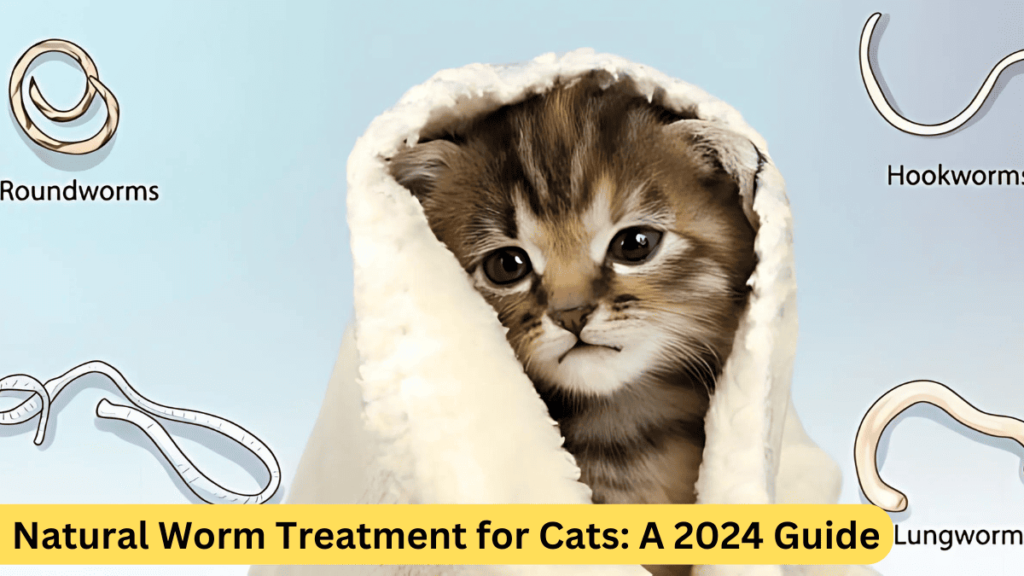
Worm infestations in cats are a common but treatable issue, especially for cats that spend time outdoors. While chemical dewormers are commonly used, many pet owners are looking for natural alternatives that can be gentler on their feline companions. This guide will cover everything you need to know about natural worm treatment for cats, how they compare to traditional methods, and what you can do to prevent worms from affecting your cat’s health.
Table of Contents
What Are Worms in Cats?
Worms are parasitic organisms that live in a cat’s intestines, feeding on their nutrients. The most common types of worms in cats include:
- Roundworms: Long, spaghetti-like worms often found in cats’ stool or vomit.
- Tapeworms: Segmented worms that resemble grains of rice.
- Hookworms: Small, thin worms that feed on the blood in the intestines.
- Whipworms: Thin worms that are more challenging to detect but can still cause health issues.
Symptoms of Worms in Cats
Detecting worms early is essential for effective treatment. Here are some symptoms that may indicate your cat has worms:
- Visible worms in the stool or around the anus
- Vomiting
- Diarrhea
- Weight loss
- A bloated or distended abdomen
- Dull coat
- Anemia (in the case of hookworms)
Are There Effective Natural Worm Treatments for Cats?
While conventional dewormers prescribed by vets are the fastest and most reliable way to eliminate worms, some natural methods can help reduce the worm burden. However, it’s essential to consult your vet before using any natural remedies to ensure they’re safe and effective.
1. Food-Grade Diatomaceous Earth (DE)
- How It Works: DE is a powder made from fossilized remains of tiny aquatic organisms. When ingested, it can help to kill worms by dehydrating them.
- How to Use: Mix a small amount of food-grade DE (1/4 teaspoon for kittens and 1 teaspoon for adult cats) into your cat’s food daily for about a week.
- Pros: Safe for most cats when administered correctly.
- Cons: Must be food-grade and carefully dosed to avoid respiratory irritation.
2. Pumpkin Seeds

- How It Works: Pumpkin seeds contain cucurbitacin, an amino acid that can paralyze worms, making them easier to expel from the body.
- How to Use: Grind raw pumpkin seeds into a fine powder and mix 1 teaspoon per 10 pounds of body weight into your cat’s food once a day.
- Pros: Natural, easy to source, and a tasty addition to food.
- Cons: May take longer to show results compared to conventional treatments.
3. Papaya

- How It Works: Papaya contains enzymes like papain that help break down the outer layers of worms, making them easier to expel.
- How to Use: Add small pieces of fresh, ripe papaya to your cat’s diet or offer papaya enzyme supplements after consulting your vet.
- Pros: Safe and nutritious.
- Cons: May not be potent enough for severe infestations.
4. Carrots

- How It Works: Shredded carrots act as a natural abrasive, scrubbing the lining of the intestines to dislodge worms.
- How to Use: Grate fresh carrots and mix a small amount into your cat’s food daily.
- Pros: Safe, natural, and provides additional vitamins.
- Cons: May not work for severe infestations.
5. Coconut Oil

- How It Works: Coconut oil has natural antiparasitic properties that can help fight worms and improve digestion.
- How to Use: Mix 1 teaspoon of virgin coconut oil into your cat’s food once a day.
- Pros: Also promotes healthy skin and coat.
- Cons: High fat content, so use cautiously in overweight cats.
Read More:
Cat Overactive Thyroid Treatment Cost in 2024
How to Prevent Worms Naturally
Prevention is just as important as treatment. Here are some natural ways to reduce the risk of your cat contracting worms:
- Regular Cleaning: Keep your cat’s litter box clean and disinfect it weekly to prevent the spread of worm eggs.
- Flea Control: Since fleas are carriers of tapeworms, natural flea repellents like cedar oil or flea-combing your cat daily can reduce the risk of tapeworms.
- Proper Diet: Feeding your cat a balanced diet with natural deworming foods like pumpkin seeds and carrots can help prevent worm infestations.
- Limit Outdoor Access: Reduce your cat’s exposure to other infected animals by keeping them indoors or monitoring their outdoor activity.
Conventional Dewormers vs. Natural Remedies
While natural remedies can be a gentler option for your pet, they may not always be as effective or fast-acting as traditional dewormers. In cases of severe infestation or for kittens, it’s essential to seek professional veterinary care to ensure the worms are completely eradicated.
Here’s a comparison of natural and conventional deworming methods:
| Treatment Type | Pros | Cons |
|---|---|---|
| Natural Remedies | Gentler on the body, often safer for kittens. | May take longer to work, not always as effective. |
| Conventional Dewormers | Quick and reliable, can treat severe infestations. | Possible side effects, more costly. |
FAQs About Natural Worm Treatment for Cats
1. Can you get rid of worms in cats naturally?
Yes, certain natural remedies like pumpkin seeds, diatomaceous earth, and papaya can help reduce the worm burden in cats. However, severe infestations usually require veterinary-prescribed medication.
2. Are natural worm treatments safe for kittens?
Some natural treatments like diatomaceous earth and pumpkin seeds are safe for kittens when dosed correctly. Always consult your vet before treating kittens, as they are more vulnerable to the effects of worms.
3. Can I prevent worms naturally?
Yes, a clean environment, proper diet, flea control, and regular stool checks can help prevent worms naturally. Adding natural deworming foods to your cat’s diet can also help.
4. Do natural worm treatments work for all types of worms?
Natural treatments may help with common worms like roundworms and tapeworms but may not be effective against more serious parasites like heartworms. A vet’s diagnosis is crucial to determine the right treatment.
5. How can I tell if my cat’s worm treatment is working?
Symptoms like a bloated belly, vomiting, and visible worms should start to improve within a few days. A follow-up stool test can confirm whether the treatment was successful.
Conclusion
While there are natural remedies available for treating worms in cats, it’s essential to consult your veterinarian before trying any home treatments. In many cases, a combination of natural and conventional methods may be the most effective strategy to keep your cat healthy and worm-free.
By maintaining a clean environment, using natural preventatives, and knowing when to seek professional help, you can ensure your cat stays worm-free and healthy in 2024 and beyond.
